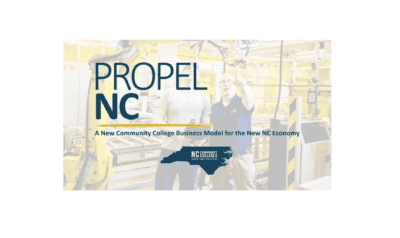

|
|
“The patient is on the operating table; we don’t have 18 months to wait.”
That was State Board of Community Colleges Chairman Tom Looney’s response to the proposal at the August 2023 Finance Committee meeting to develop a new funding model for our colleges by January 2025. Looney then asked a group of college presidents in the audience how long it would take to develop an improved funding model for all 58 colleges. He asked if we could deliver it “at the speed of the business” to have it ready for the General Assembly in time for the short session set to begin in April 2024.
We accepted the challenge, assembling a team of presidents who developed a conceptual framework and timeline and worked with the system office staff to model and refine a four-pronged approach. The proposal was unanimously approved by the presidents in December, the Trustees Association in January, and the State Board of Community Colleges in February.
From August through January, we did what we do best. North Carolina community colleges are nimble, adaptive, and responsive to our state’s needs. We pulled together colleges of all sizes and worked with our system office staff to craft a new plan that will empower and incentivize our colleges to meet the workforce needs of our growing state.
Usually, the making of the sausage is less interesting than the sausage itself, but it may be helpful to share some insight in how Propel NC came to be.
Dr. Laura Leatherwood appointed a small group of presidents representative of the system in terms of college size and location. We established basic ground rules in our framework. The total for the request would be limited to the unfunded portion of our most recent system recurring budget request. We decided upfront that no college would be diminished, that we would not create a “zero sum game.” All 58 colleges, their students, and communities deserve the opportunity to succeed.
It was a deep, complex process this past fall as we considered two counter proposals and had to eliminate two original components due to a lack of data and recent changes in the law. Revising multi-campus funding and incentivizing shared programs between colleges were recognized as important but required additional analysis and information to move forward.
A second group of presidents then worked with Chairman Looney, President Jeff Cox, and his team to package and label the four completed components so we could explain how this new model would benefit our entire state both educationally and economically. This recursive, creative process gave us the Propel NC label and identity that has generated so much interest these past few weeks.
Why did we do so much work in such a few weeks?
Why the urgency to make these changes?
What makes Propel NC compelling enough to deserve more than $93 million from our General Assembly?
Why Propel NC matters. Why now.
The change from tiers to workforce sectors does more than bring in new dollars and simplify our categories. It changes our business model at the college level.
We will be able to make program and course decisions based on the quantified labor market value that education brings to the student as recognized by our state’s employers. The choice of offering a degree or short-term certificate will be driven by the value proposition for the student and the needs of the employers.
When the degree is expected by the employer, we can offer the best degree in the world. But if the degree is not required, we will be able to afford the same faculty to provide the credential providing the skills and knowledge that employers value, saving students money and time and increasing the number of students who attain a degree or credential.
The base allocations for all colleges have not been adjusted for inflation since the 1980’s, and the requested increase recognizes the fixed and variable costs every college bears to support student success and provide operational stability and excellence.
Our colleges have no way to predict the next year’s enrollment, since we register students right up until the first day of classes. When a college does see a surge in enrollment, they often lack the available funding to meet the challenges of unexpected classes and sections. Having a stable, predictable source of supplemental funding from an Enrollment Growth Reserve would help offset these additional costs so no one is turned away from a high demand course.
Lastly, changing the statutes to allow for proportionate tuition retention would allow for improved operational and strategic planning by colleges. When our enrollments increase and tuition receipts grow beyond expected levels, we are asking that those excess monies be returned proportionately to local colleges in the next fiscal year. This would encourage and reward well-managed colleges that meet their communities’ needs effectively.
Our joint advocacy is making the difference between Propel NC transforming from an idea into reality.
Thanks to efforts of our presidents, Dr. Cox has received more than 150 letters from business leaders and employers supporting the new model, sending this same message to the N.C. House and Senate. The feedback from legislators to our presidents, trustees, and system leadership this winter has been generally supportive of the changes Propel NC would bring to our colleges. They are asking questions about the details at both the local and system level, but the common theme developing is that we have listened to their suggestions and are aligning our programs and services to help close North Carolina’s workforce gaps and fulfill our uniquely comprehensive missions.
As legislators return to Raleigh later this month, let’s expand our combined efforts to reinforce the need for this new way of doing business, so we can build on our strengths and do those things for our citizens only community colleges can do at the state, regional, and local levels, providing world-class programs and services at the “speed of business.”





